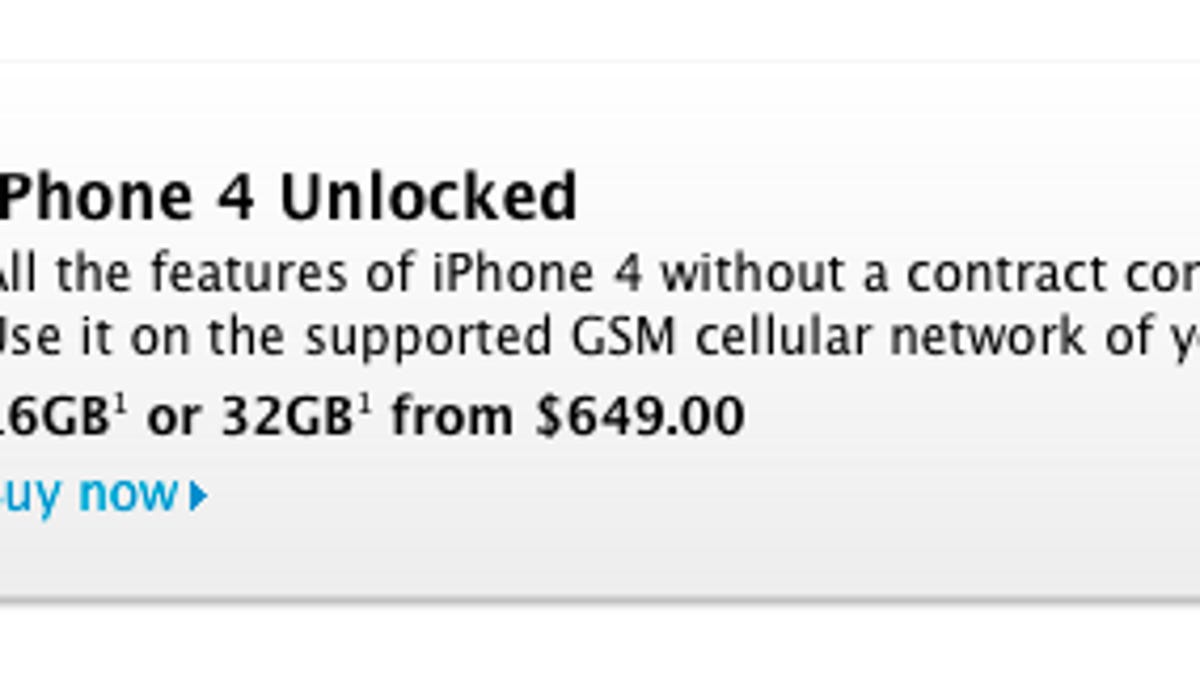5 reasons an unlocked iPhone is important
An unlocked iPhone is not a new thing for Apple, but offering it in the U.S. is. CNET breaks down five reasons why this is an important move for Apple, and its iPhone.

The quiet release of an unlocked iPhone by Apple yesterday marked an important chapter in the history of a device that's gone on to become an enormous part of the company's business.
When Apple first launched the iPhone, the carrier component was one of the biggest parts of the story. Apple had wrangled back control over the software on the device, yet U.S. customers were relegated to AT&T, a situation that persisted until this year with the release of a CDMA iPhone for Verizon's network. Now, you can get an iPhone on 200 carriers worldwide, with many countries having a multiple carrier option. The unlocked iPhone in the U.S. is, in part, a response to that critical mass.
But there's much more to the story than that. Here are five big reasons the unlocked iPhone is a big deal:
1. No contracts. Yes, the $649 and $749 price tags are a complete deal breaker for most people, but with what monthly service and a data plan costs--and more importantly, international data packages--that's just a chunk of what you end up paying over two years if you're someone who genuinely needs an international phone.
Having an unlocked phone lets you to jump on a shorter-term plan (if you can find one), as well as use pre-paid GSM services right out of the box. For a device with an annual update cycle (albeit one that's a bit late this year), that's a nice assurance for frequent upgraders or people who think they'll cut and run halfway through a two-year contract.
This is not the first iPhone to be offered free of contacts. Previous models could be purchased at their unsubsidized price, but they were still carrier locked. The fact that this is both contract-free and carrier unlocked is a big step forward in Apple offering iPhones with less strings attached at the point of sale, much like the original iPhone.
2. No more hacks. If you wanted an unlocked iPhone before, it could be done with third-party software hackery. However, this was a big cat-and-mouse game and one that Apple's gotten better at over the years.
Those who partook in one of these software hacks could enjoy an unlocked phone, but with no guarantee that the fix would stick around long enough to last to the next software update from Apple. For most people, this behavior of having to worry about being kept out of getting new phone features, or having bugs fixed might not have been worth having an iPhone that could be used in more places.
Another option was going through various gray market unlocking solutions, which promised to provide a so-called "factory unlock," or one that would not be affected by software updates. Two stores offering such unlocks for the iPhone cropped up in April, and later closed up shop weeks later, citing problems with the provider who was supplying the unlocks for AT&T specifically. Going forward, that's business Apple may now be able to get.
3. Makes the iPhone a juicier target for traveling business users. In its most recent quarterly earnings call, Apple noted that the iPhone was being tested or deployed by 88 percent of the Fortune 500. This new option allows companies big and small to buy phones that will work just about anywhere, and without a contract. This is likely to have a bigger impact on frequent business travelers who are hopping between countries and may not have a company roaming plan.
The fact remains that you can buy unlocked iPhones in other countries like Australia, Belgium, and France--you just have to be in those countries. This now lets U.S.-based businesses buy up those devices here.
4. Puts the iPhone on unsupported carriers. Carrier doesn't sell an iPhone, but you want to use one anyways? If it's a GSM network, you're in luck. At least that's now the case with T-Mobile here in the U.S. Yes, you won't be getting that sweet 3G speed, but it's better than having to rely on one of the aforementioned hacks to get a device working. Is a big group of T-Mobile users likely to shell out for an unlocked iPhone right now with the pending AT&T/T-Mobile merger in the works? Probably not.
As Asymco's Horace Dediu noted in a post yesterday, this could have a bigger impact on the countries without carriers that are supported by Apple, but with networks the iPhone 4 will work on. Groups that buy these devices in the U.S. and then move them elsewhere can now offer the iPhone 4 and expand Apple's reach into places it is not yet set up to sell to.
5. And last but not least, the next iPhone is on the minds of many, and this gives the iPhone 4 a shot in the arm. Apple certainly isn't hurting on iPhone sales, moving 18.65 million of them during the company's most recent fiscal quarter. But if the next iPhone arrives without an unlocked model, this could extend the sales of the iPhone 4 to people who want to stay in the ecosystem and who need an unlocked device.

